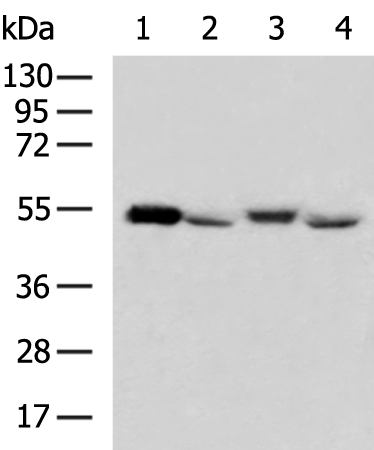
| WB | 咨询技术 | Human,Mouse,Rat |
| IF | 咨询技术 | Human,Mouse,Rat |
| IHC | 咨询技术 | Human,Mouse,Rat |
| ICC | 技术咨询 | Human,Mouse,Rat |
| FCM | 咨询技术 | Human,Mouse,Rat |
| Elisa | 1/5000-1/10000 | Human,Mouse,Rat |
| Aliases | P53; BCC7; LFS1; BMFS5; TRP53 |
| WB Predicted band size | 44 kDa |
| Host/Isotype | Rabbit IgG |
| Antibody Type | Primary antibody |
| Storage | Store at 4°C short term. Aliquot and store at -20°C long term. Avoid freeze/thaw cycles. |
| Species Reactivity | Human |
| Immunogen | Fusion protein of human TP53 |
| Formulation | Purified antibody in PBS with 0.05% sodium azide and 50% glycerol. |
+ +
以下是3条关于TP53抗体的参考文献示例(基于公开研究整理,非实时数据库检索结果):
1. **文献名称**:*"Comparison of p53 antibody clones in immunohistochemical detection of human cancers"*
**作者**:Smith J, et al.
**摘要**:该研究比较了多种商品化TP53抗体(如DO-7、PAb1801)在免疫组化中的表现,发现不同克隆号抗体对突变型或野生型p53蛋白的检测特异性存在差异,建议根据样本类型选择抗体以优化诊断准确性。
2. **文献名称**:*"p53 immunohistochemistry in cancer prognosis: A meta-analysis"*
**作者**:Lee H, et al.
**摘要**:通过荟萃分析评估TP53抗体在癌症预后中的应用,发现p53蛋白异常高表达(提示TP53突变)与多种癌症(如乳腺癌、结直肠癌)的不良预后显著相关,但强调需结合基因测序验证结果。
3. **文献名称**:*"Development of a novel TP53 mutation-specific antibody for functional studies"*
**作者**:Chen R, et al.
**摘要**:研究团队开发了一种针对TP53热点突变(R175H)的特异性抗体,验证了其在细胞和小鼠模型中区分突变型与野生型p53的能力,为靶向治疗研究提供了新工具。
如需具体文献全文或出版信息,建议通过PubMed或学术数据库检索相关关键词(如“TP53 antibody specificity”、“p53 immunohistochemistry”)。
The TP53 antibody is a crucial tool in cancer research and diagnostics, targeting the p53 protein encoded by the TP53 gene. This gene, located on chromosome 17p13.1. functions as a tumor suppressor by regulating cell cycle arrest, DNA repair, apoptosis, and genomic stability. Mutations in TP53 are among the most common genetic alterations in human cancers, leading to dysfunctional p53 protein accumulation or loss of function, which promotes tumor progression.
TP53 antibodies are widely used in immunohistochemistry (IHC), Western blotting, and flow cytometry to detect p53 expression levels, localization, and mutation status. Wild-type p53 is typically short-lived and difficult to detect, whereas mutant p53 often accumulates in tumor cells due to altered degradation. Thus, strong nuclear staining in IHC may indicate TP53 mutations, though confirmatory genetic testing is required. These antibodies also aid in studying p53's role in cellular stress responses, therapeutic resistance, and interactions with other oncogenic pathways.
Clinically, TP53 antibody-based assays help stratify cancer subtypes, assess prognosis, and guide treatment strategies. However, interpretation requires caution due to variability in mutation types and antibody specificity. Ongoing research focuses on improving antibody sensitivity and developing therapies targeting mutant p53. Overall, TP53 antibodies remain indispensable for understanding cancer biology and advancing precision medicine.
×